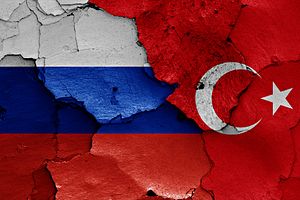After seven months of stalled relations–barbed comments and sanctions–Russia and Turkey may be moving toward a rapprochement. On Monday, according to the Russians, Turkish President Recep Tayyip Erdogan sent a letter “in which the Turkish President expressed his desire to settle the situation concerning the downing of a Russian military aircraft.”
In the letter, Erdogan “expressed his deep regret for what happened” regarding the November 24, 2015, incident in which Turkey shot down a Russian jet along the Turkish-Syrian border, resulting in the pilot’s death. The incident led to a breakdown of relations between the two countries: Russian President Vladimir Putin called Turkey “accomplices of terrorists” and imposed imposed sanctions on Turkey as well as suspending visa-free travel and package vacations to the country.
In February, RT reported that trade turnover between the two countries had fallen to $23 billion. The implication being that Turkey was suffering from the sanctions. The article quoted the Russian ambassador to Turkey, Andrey Karlov, as saying, “Turkish businessmen are very well-educated people and understand why they lost contracts in Russia, and with them billions of dollars.”
But in August 2015–before the downing of the jet and subsequent sanctions–Bloomberg reported that Turkish exports had fallen to their lowest point since 2010 during summer 2015:
Exports declined on an annual basis for the seventh month in a row as demand for Turkish goods in main markets fell. Shipments to Russia, Turkey’s second largest trade partner in 2014, dropped by 48 percent from July last year while exports to the European Union declined 14 percent
The implication being that the slowdown in trade had roots in Russia’s economy.
Nonetheless, the sanctions had a serious impact on Turkey’s tourism business. According to Reuters, tourist arrivals in Turkey “saw their biggest drop in at least 22 years in May, with the number of Russians down by more than 90 percent.”
Turkey’s tourism sector has also been hurt by a rise in terrorist attacks. Tuesday, three men attacked Turkey’s main airport in Istanbul. As many as 41 people were killed when the attackers detonated suicide vests, and as many as 300 were injured. According to The Guardian, “In just over a year, 17 attacks have killed more than 300 people, many of them in Istanbul.”
Wednesday, Putin called Erdogan. In the call, Putin condemned the Istanbul attack and expressed his condolences. According to the Kremlin readout, “Both presidents stressed the need to activate international cooperation to combat the terrorist threat that poses a danger to all countries.”
In televised comments after the call, reported by AFP, Putin said “I ask that the Russian government begins the process of normalising general trade and economic ties with Turkey.” The Turkish side confirmed, with Ankara’s readout of the call noting the two leaders “underlined the importance of acting in cooperation in the face of political, economic and humanitarian crises in the region as well as taking necessary steps to revive the bilateral relations.”
This was a departure from the mood telegraphed from Moscow by Kremlin spokesman Dmitry Peskov on Tuesday (before the Istanbul attack). Peskov had told reporters on a conference call–nudging back against Turkish optimism–“One should not think it possible to normalize everything within a few days, but work in this direction will continue.”
On July 1, at the Black Sea Economic Cooperation Organisation’s foreign ministers meeting in Sochi, Russia, the Turkish and Russian foreign ministers will meet. The two presidents also reportedly agreed to work towards meeting in the near future. The Kremlin categorized the call as “business-like, constructive, and focused,” an improvement over the rhetoric of late 2015 between the two leaders.
But it’s not necessarily smooth sailing from here for Ankara and Moscow. The two nations still don’t see eye-to-eye with regard to Syria; Turkey is staunchly in favor of booting Syrian President Bashar al-Assad who enjoys Russian support. At the same time, Erdogan’s increasingly authoritarian tendencies have put him more at odds with the West and politically closer to Russia, perhaps generating some of the energy in Ankara to repair relations with Moscow.
Turkey also recently pursued a rapprochement with Israel, announcing the normalization of ties on Monday after a six-year interlude and signing the agreement formally on Tuesday. Relations between the two states broke down as a result of the so-called 2010 Gaza flotilla raid in which Israeli military forces assaulted a flotilla of ships, organized by Turkish activists, breaking the Israeli-Egyptian blockade of the Gaza strip. Nine Turkish citizens were killed in the raid. In July 2011, a UN report determined the raid was legal, after which Turkey expelled Israel’s ambassador.

































